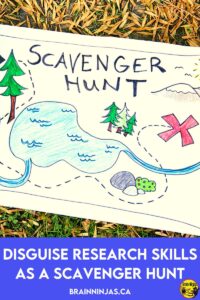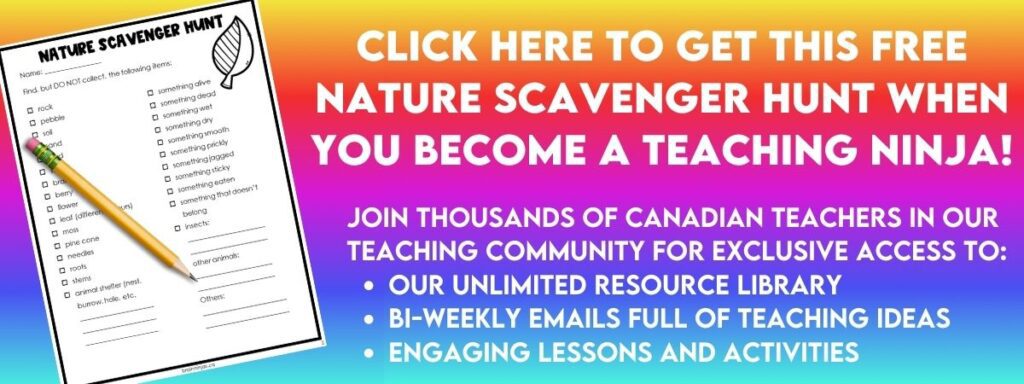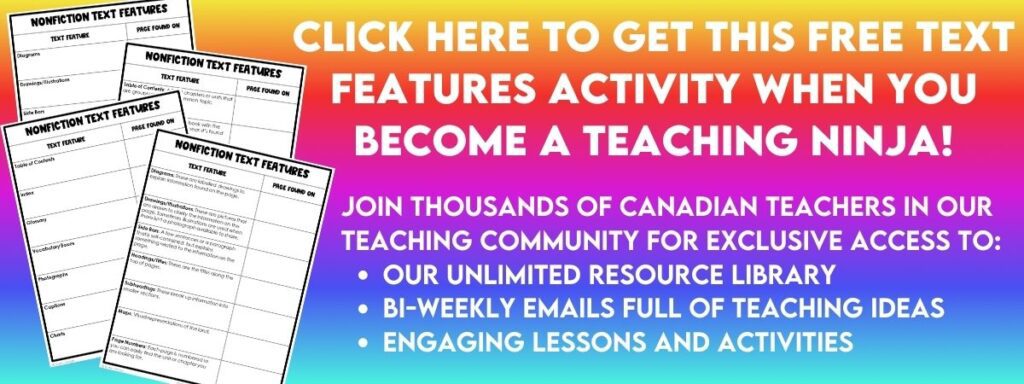
Sometimes students don’t understand how time is of the essence when doing research. They lack the research skills to use text features, skim materials, and find items quickly. Not only does this slow down their work, it often results in incomplete research and general frustration.
It is a struggle year after year.
However, we have managed to find some activities that help students refine their research skills: scavenger hunts. It turns out that making research fun and game-like can have a positive impact on how students complete research.
When Research Was Books…
Growing up, the internet wasn’t even a thing. We know that dates us, but it also made us pretty good at using books to find information. Each week we would head down to our school library where we would learn some new skills like using a card catalogue, reading an index or finding information is that giant set of encyclopedias.
Now, most schools don’t have a card catalogue, lots don’t have encyclopedias and some have even tossed out the very helpful librarian. School money is no longer spent on library books as more and more technology is purchased and needs to be replaced. If you’re lucky enough to still have a librarian, you have an untapped resource. You should read our post: Research Skills in the Library for more ways to put that library to use.
We’re all for technology, but books serve a very specific purpose-text features. Now, if you want more information about that, we recommend you read our post How to Teach Research Skills With Text Features for more information about how you can teach these in your classroom.
If you have technology…

Just having the devices in your classroom will not teach your students how to find information. It’s important to show students how to use search engines, figure out if the information is accurate or not, or even how to use them safely. We have more information in this post How to Teach Research Skills With Google Search and in our Online Safety and Digital Citizenship lesson plans. Find them in our TpT Store ($USD) or BN Shop ($CAN).
We needed a way to combine the use of books with the use of technology so students could learn to search for information quickly and accurately. It needed to be something that students could combine what we teach in class with the skills they can apply on their own.
We came up with scavenger hunts.
Now, for fun, we sent our students on a very simple scavenger hunt where we went outside and found something in nature. We don’t recommend this activity during the winter as it makes finding some of the items very tricky but give our Nurturing Nature Activities a try. You can find it in our Resource Library or we can email it to you when you join our email list.
It was low-tech, but it taught students to check to see what they are supposed to be looking for. That’s a vital skill when doing researching-what information are you trying to find?
For a more high-tech version of a scavenger hunt, try using the app Goose Chase. You can create scavenger hunts forever!
Scavenger Hunts in the Classroom?

The premise is simple: give your students something to search for. We use scavenger hunts because they are low risk, are quick to do, and help students build confidence by creating an opportunity to be successful.
Start very simple
Our scavenger hunts always start simply: Find the name of the province with Fredericton as its capital city. We give students books, maps or anything else on hand.
It usually takes them a few minutes to figure out they should be looking up Fredericton instead of searching a random map. We teach how to use an index to quickly help you find (or not find) the topic in a book. Game changer!
We give students access to books and textbooks that we have already determined have information that will be valuable to students.
Go online
Then we branch out less obvious: Find the capital city of the country of Guyana. This is more difficult because we don’t really have any classroom materials where this would be found (we recently tossed a globe with the USSR still on it). Here is where we introduced looking online. We practice searching.
Once students can find these things quickly and simply using books (and online when we’re ready) they can begin to look for more complex items.
We explicitly teach students how to read photographs, charts, pictures, maps, and graphs so they can use the information to deepen their understanding. All of these text features are vital to understanding non-fiction text. Not knowing how to make use of these features makes researching much more difficult.
You might find this post about finding and using text features helpful. We also have this text features activity. You can find it in our Resource Library or we can send it directly to your inbox when you sign up for our email list.
Once students have good information, we start to allow them to find information online-but a big part of this step is teaching students how to determine whether or not the online information is accurate.
We teach students to fact check, This includes teaching students to find out about the website, verify the facts on more than one site and confirm the information is up to date.
Don’t forget to look at tourism sites as they are often full of information related to specific geographical areas.
Branch out

After teaching some skills and practicing with students over the course of a few days or weeks, we eventually set our students loose on a longer, more in-depth scavenger hunt. We teach in a Grade 4/5 Canadian classroom, so our students use the scavenger hunt for their content in social studies.
Canadian Geography Scavenger Hunt: This focuses on cities, towns, teams and other geographical details from within the borders of Canada. Two different paper versions, as well as a Google Slides version, so your students can work on this whether you’re teaching in the classroom or doing distance learning. Get it on our TpT Store ($USD) or our BN Shop ($CAN).
Alberta Scavenger Hunt: This scavenger hunt looks at the cities, towns, teams, and other geographical details from within the borders of Canada. It includes two different paper versions, which our students use as a book. Get it on TpT Store ($USD) or BN Shop ($CAN).
We made a British Columbia Scavenger Hunt that includes cities, towns, and teams related just to BC. Get it on TpT Store ($USD) or BN Shop ($CAN). We were asked to create a Saskatchewan Scavenger Hunt, so we did. Get it on TpT Store ($USD) or BN Shop ($CAN).
Check out these other scavenger hunts:
Manitoba Scavenger Hunt: Includes some of the best places in Manitoba and can be found on TpT STore ($USD) or BN Shop ($CAN).
Ontario Scavenger Hunt: Many of Ontario’s rural areas including the far northern reaches are included in this hunt. Get it on TpT Store ($USD) or BN Shop ($CAN).
Quebec Scavenger Hunt: Both English and French place names are included throughout this hunt. Get it on TpT Store ($USD) or BN Shop ($CAN).
Newfoundland and Labrador Scavenger Hunt: Both the rock and mainland are included in this hunt. Get it on TpT Store ($USD) or BN Shop ($CAN).
The Maritimes Scavenger Hunt: (Includes Prince Edward Island, New Brunswick and Nova Scotia): Since these areas are small, we put them together so that there were enough names for places for each letter. Get it on TpT Store ($USD) or BN Shop ($CAN).
Northern Canada Scavenger Hunt: (Includes Nunavut, Northwest Territories and Yukon): since many of these communities are remote and there are far fewer of them, we decided to celebrate these territories together. Get it on TpT Store ($USD) or BN Shop ($CAN).
Get the whole bundle all at once: This set includes all ten of the scavenger hunts at a reduced price. All of our scavenger hunts can be done with paper or completed online, making it a perfect activity for in-person classes or distance learning. This is a classroom staple for our students. Get it on TpT Store ($USD) or BN Shop ($CAN).
Use This Between Other Lessons
These are not “quick” activities. We introduce them and then let students pick away at them over the course of the term (or in one case all school year-long) when they have all their work finished. Some of the students enjoy the challenge of trying to find an answer for every single clue. Others try to find several answers for the same clue.
Most students do not find every single answer. That’s ok. That really isn’t the purpose. It’s not about getting all the answers and winning. It’s about learning to develop quick skills that can be used over and over when doing research in any subject area.

We know there are more skills to prepare students to create quality research, but having students learn to locate information quickly has significantly helped our students with their overall research skills.
They became very skilled at using indices, tables of contents, skim reading and looking for information using the headings on pages. These are skills that students need in every subject area, especially when they are doing research.
Do you use scavenger hunts? There are so many online that you should have no trouble finding one that works for your classroom. Give them a try!
Scavenger Hunts Come in Lots of Forms
You can use scavenger hunts for lots of different reasons. We use them because the feeling that students are competing in a game makes learning fun.
When learning online unexpectedly, we played all kinds of games, but one of the most popular was a simple scavenger hunt where students had to try to find different items.
For example: find something yellow. That was pretty simple.
Then we made it more complicated: find something yellow that has fur.
Students who are new to English were sent to look for specific items, items that start with letters, actual letters or word names to help them practice different words.
We had students submit ideas (which was their own scavenger hunt) for one week and then we used these ideas for the weeks after. It was lots of fun. Students can be so creative.
Do your students need help with the technology part? Try reading Must Know Tech Skills You Should Teach Your Students.
Do you have an idea for another one we can make with our students? We are always looking for new topics. We often loop with our students so we never do the same exact activities for two years in a row. Leave us a comment below and maybe we’ll create it for you.








